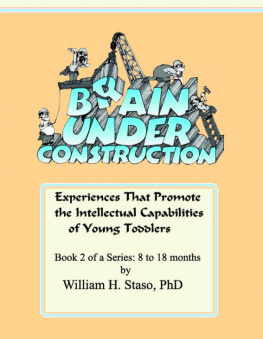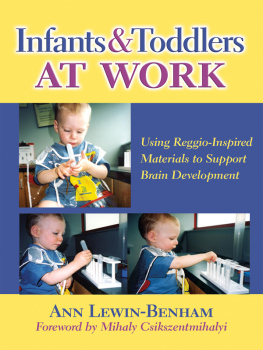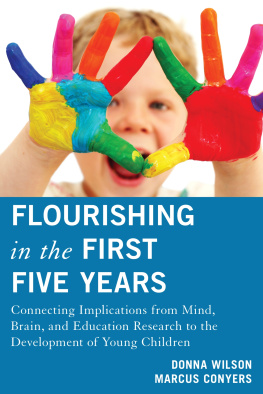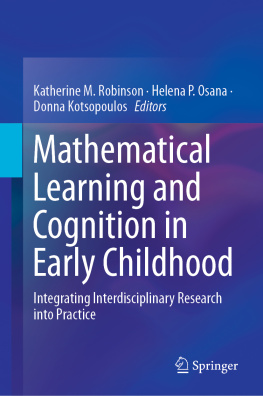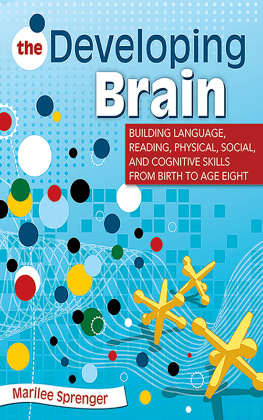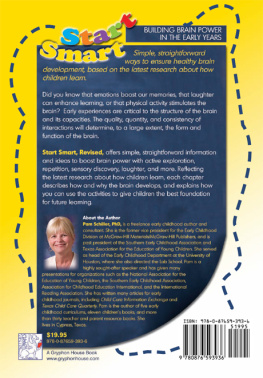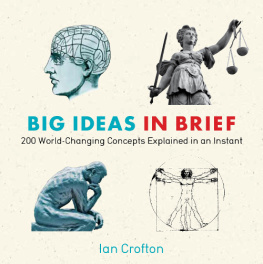William H. Staso - Brain Under Construction
Here you can read online William H. Staso - Brain Under Construction full text of the book (entire story) in english for free. Download pdf and epub, get meaning, cover and reviews about this ebook. year: 1997, publisher: Great Beginnings Pr, genre: Children. Description of the work, (preface) as well as reviews are available. Best literature library LitArk.com created for fans of good reading and offers a wide selection of genres:
Romance novel
Science fiction
Adventure
Detective
Science
History
Home and family
Prose
Art
Politics
Computer
Non-fiction
Religion
Business
Children
Humor
Choose a favorite category and find really read worthwhile books. Enjoy immersion in the world of imagination, feel the emotions of the characters or learn something new for yourself, make an fascinating discovery.
- Book:Brain Under Construction
- Author:
- Publisher:Great Beginnings Pr
- Genre:
- Year:1997
- Rating:4 / 5
- Favourites:Add to favourites
- Your mark:
- 80
- 1
- 2
- 3
- 4
- 5
Brain Under Construction: summary, description and annotation
We offer to read an annotation, description, summary or preface (depends on what the author of the book "Brain Under Construction" wrote himself). If you haven't found the necessary information about the book — write in the comments, we will try to find it.
Brain Under Construction — read online for free the complete book (whole text) full work
Below is the text of the book, divided by pages. System saving the place of the last page read, allows you to conveniently read the book "Brain Under Construction" online for free, without having to search again every time where you left off. Put a bookmark, and you can go to the page where you finished reading at any time.
Font size:
Interval:
Bookmark:
Brain Under Construction
Experiences That Promote the Intellectual Capabilities
of Young Toddlers
William H. Staso, PhD
Book Two of a Series:
8 to 18 Months
Smashwords Edition
This ebook is licensed for your personal enjoyment only. This ebook may not be re-sold or given away to other people. If you would like to share this book with another person, please purchase an additional copy for each person. If youre reading this book and did not purchase it, or it was not purchased for your use only, then please return to Smashwords.com and purchase your own copy. Thank you for respecting the hard work of this author.
All Rights Reserved, including the right of reproduction in whole or in part of any form
International Standard Book Number: 0-9644245-1-7
Library of Congress Catalog Number: 97-92240
Front Cover Line Art by Todd Banter
INTRODUCTION
CHAPTER ONE
CHAPTER TWO:
CHAPTER THREE
CHAPTER FOUR
Part Two: Theoretical and Research Data
CHAPTER FIVE
CHAPTER SIX
CHAPTER SEVEN
APPENDIX
In his preface to his first edition of his book The First Three Years of Life (1975), Burton White stated his belief, after some 17 years of research, that not one child in ten gets off to as good a start as he could. He repeated that comment in his second edition in 1985, and in the third edition in 1990 he lamented that For the most part, our educational system still operates as if no important learning takes place until a childs sixth birthday is reached. This opinion is being shared by an increasing number of individuals and groups.
The Carnegie Task Force in 1994, in reviewing the status of young children in this country, concluded that our nations children under the age of three and their families are in trouble, and their plight worsens every day. They cogently argued for a national response to what they refer to as a quiet crisis. The task force cited a report completed in 1993 by the National Educational Goals Panel that only half of all infants and toddlers are routinely read to by their parents, and many parents give insufficient attention to their childrens intellectual development. Teachers, they state, report that one in three American kindergarteners arrives in school unprepared to learn. They add this warning: if left unattended, this crisis will ultimately compromise our nations economic strength and competitiveness.
Staff at the Frank Porter Graham Child Development Center reviewed four large studies of infant-center care centers from 1992-1995 in a report entitled Quality of Center Child Care and Infant Cognitive and Language Development (1996). These studies, they observe, uniformly found poor quality of care in these facilities. For instance, a 1995 report of 214 care centers in four states indicated that only 8% provided developmentally appropriate care based on process measures of quality. Some centers were even seen to jeopardize the development of the infants and toddlers. The authors of the report (Burchinal, Roberts, Nobors, and Bryant) conclude that researchers and policymakers should focus on how quality of infant and preschool care can be enhanced to improve, not impair, child development.
Joan Beck, columnist for the Chicago Tribune, and an advocate for early childhood education, wrote the following in her column in October 1996:
Of all the stories I have ever covered, nothing is more exciting or important or promising than the new research about the human brain. And nothing has been more frustrating than watching so much of this new knowledge go unused when the potential benefit for individuals and society is so enormous.
In Time magazines special report Fertile Minds (1997), writer J. Madeline Nash makes a similar point: If parents and policymakers dont pay attention to the conditions under which this delicate process [of brain wiring] takes place, we will all suffer the consequences.
...there is a growing awareness that something is seriously wrong with the way we raise our young children. Separately, neuroscientists and early childhood experts have reached the same conclusion: A young mind denied opportunities is a young child denied potential.
This book is dedicated to those who are working to orient this countrys focus of educational efforts where it most importantly belongs, on the developing minds of infants and toddlers. We indeed have a lot of information. The time has come to use it.
Introduction
If you have a child in the 8 to 18 month age range, consider yourself lucky. The excitement children this age generate is contagious, it rubs off. Your little one has a thirst for knowledge and learning unparalleled at any other time in life. No longer does he* just watch the world around him. With curiosity and interest he will launch out, investigating on his own, in much the same way that an experimental scientist does. His facility for understanding and using language will develop rapidly as he attends to sounds and the words he hears. And in this marvelous development, you can be of great help to him.
In this first part of the book, you will be assisted with many ideas, some of which are illustrated with the help of a young toddler named Jonna and a few of her age mates.
*Book One referred to all infants in the feminine gender. This book will refer to unspecified members of this age group as males, simply for ....well, simplicity.
Others you will meet include Joe, Jasmine, Jason (I think there is a pattern here!) and Blythe.
In the last decade, neuropsychologists working with new computer technology have given us important insights into the ways the brain changes with experience. For instance, it is becoming increasingly clear that as a species we have predispositions to learn and understand certain information, such as languages, physics, and even math!!! Experimental studies using sophisticated imaging equipment reveal that when the brain receives environmental stimulation, its physical structure is actually changed. With respect to the topic of this publication, the research indicates that the experiences we provide our infants and toddlers will affect how well they understand, reason with, and remember information. There is a growing consensus among developmental psychologists that a childs environment may well influence his developing IQ by 20 or more points ---and this is the key time for your attention to that environment.
If you provided your infant the types of stimulation suggested in the first book in this series, Neural Foundations, you will recognize some of the emphases discussed in this present book. As a world class explorer, your toddler will experiment with cause-effect events, look for similarities and differences, and begin to organize visual, auditory, tactile, and other sensory data in constructive yet complex ways. And his language capability will expand greatly. Even if you dont hear your child speak many words, he will be learning hundreds of new words during this time period and understanding what you say better day by day.
Inside your child's brain, connections among nerve cells are continuously being formed. These physical connections reflect associations among events and objects he encounters in the world in which he is being raised. This book will inform you as to what types of experiences contribute most critically to the development of the skills and competencies that are commonly regarded as the basis for intelligence.
The book is arranged in two major parts:
The first part focuses on suggestions you can use as a parent or caretaker to optimize your young toddlers capabilities
With an understanding that most parents and caretakers are interested in locating ideas to assist their children, the suggestions section was placed in the first part of the book. However, the ideas were not meant to represent a comprehensive range of possibilities. Everyones environment and interests are different. What your family values as important for your child to learn may be different from what your neighbor values. Thus, knowing the underlying basis for brain development becomes important in order to forge your own ideas and activities. Thats where the second part comes in.
Next pageFont size:
Interval:
Bookmark:
Similar books «Brain Under Construction»
Look at similar books to Brain Under Construction. We have selected literature similar in name and meaning in the hope of providing readers with more options to find new, interesting, not yet read works.
Discussion, reviews of the book Brain Under Construction and just readers' own opinions. Leave your comments, write what you think about the work, its meaning or the main characters. Specify what exactly you liked and what you didn't like, and why you think so.

